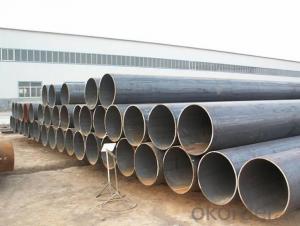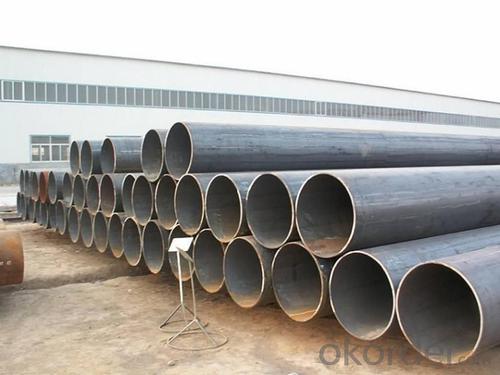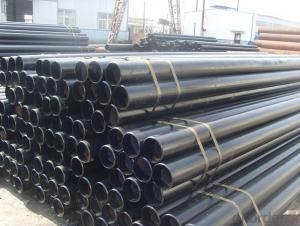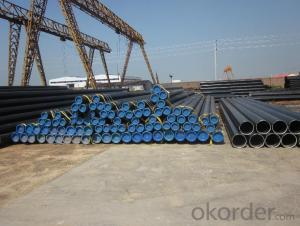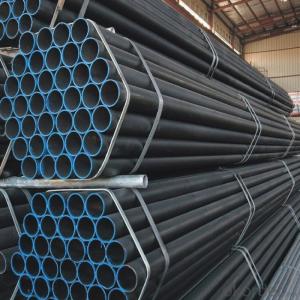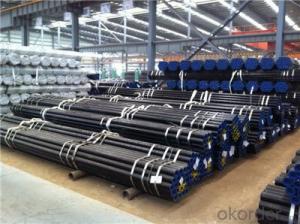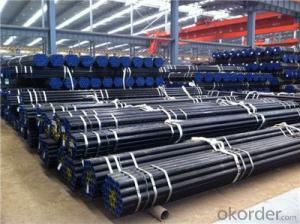CARBON STEEL SEAMLESS PIPES FROM CNBM WITH GOOD PRICE
- Loading Port:
- Tianjin
- Payment Terms:
- TT OR LC
- Min Order Qty:
- 50 m.t.
- Supply Capability:
- 500 m.t./month
OKorder Service Pledge
OKorder Financial Service
You Might Also Like
Product Description:
OKorder is offering high quality Seamless Steel Alloy Pipe at great prices with worldwide shipping. Our supplier is a world-class manufacturer of steel pipe, with our products utilized the world over. OKorder annually supplies products to European, North American and Asian markets. We provide quotations within 24 hours of receiving an inquiry and guarantee competitive prices.
Product Applications:
Seamless Steel Alloy Pipe is ideal for long distance oil, gas, and natural gas pipelines on land and offshore. They can also be applied in construction projects, offshore platforms, power stations, the petrochemical industry and municipal construction.
Product Advantages:
OKorder's Steel Pipe is durable, resists corrosion and is recyclable.
Main Product Features:
· Premium quality
· Prompt delivery & seaworthy packing (30 days after receiving deposit)
· Corrosion resistance
· Professional Service
· Competitive pricing
Product Specifications:
Grade: A213 A335 A199
Certification: Mill test certificate, EN 10204/31B
Dimensions:
Wall Thickness: 0.250" – 4.00" (hot finish), 0.035" – 0.875" (cold drawn)
Outer Diameter: 2" - 30" (hot finish), 0.875" - 18" (cold drawn)
Treatment: Annealed, fully annealed, bright annealed, spheroidize annealed, normalized, stress relieved, cold finished, quenched, tempered
Testing: Chemical component analysis, mechanical properties (ultimate tensile strength, yield strength, elongation), technical properties (flattening, flaring, bending, hardness, impact, etc), exterior size inspection
MOQ: 25 tons
Packaging: Bundle, beveled or plain end, varnish, PVC end caps
Images:
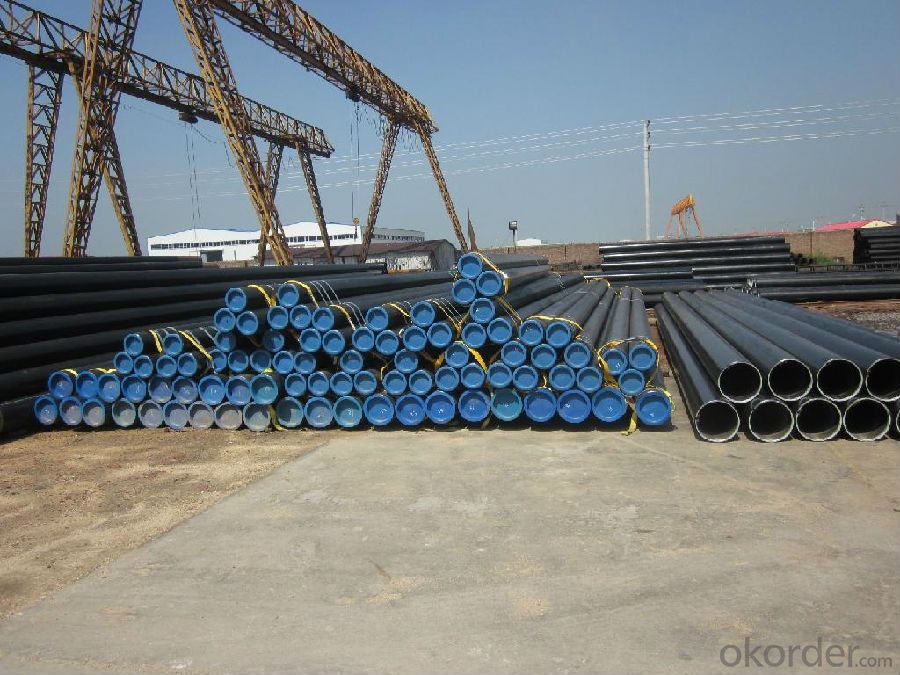
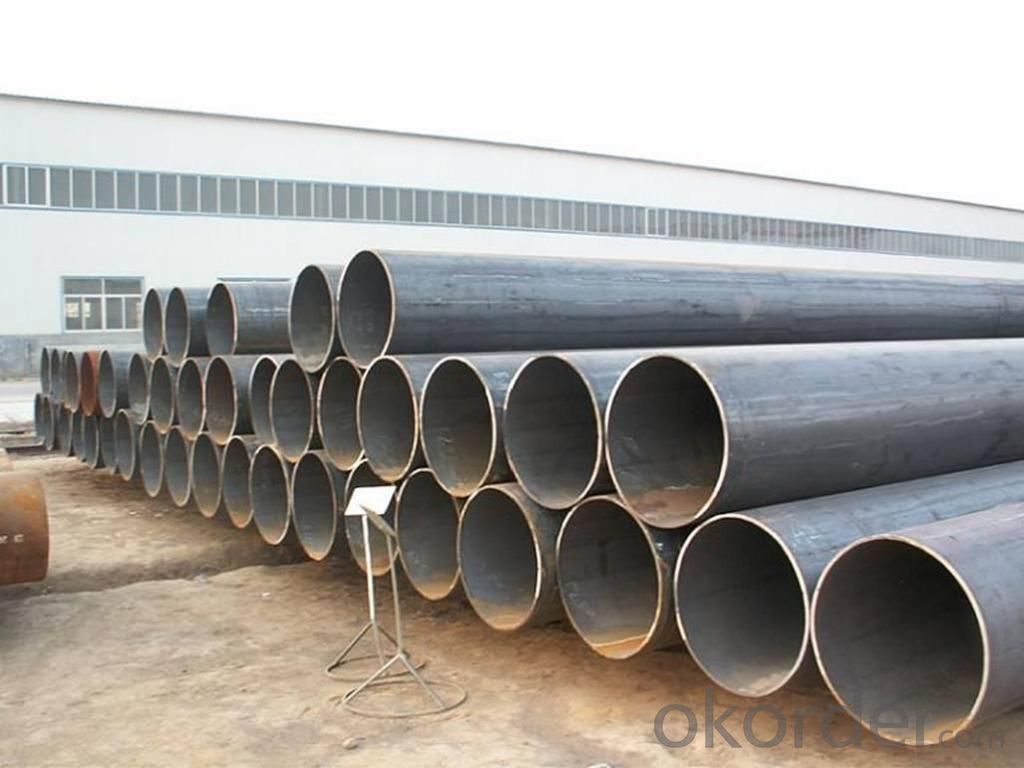
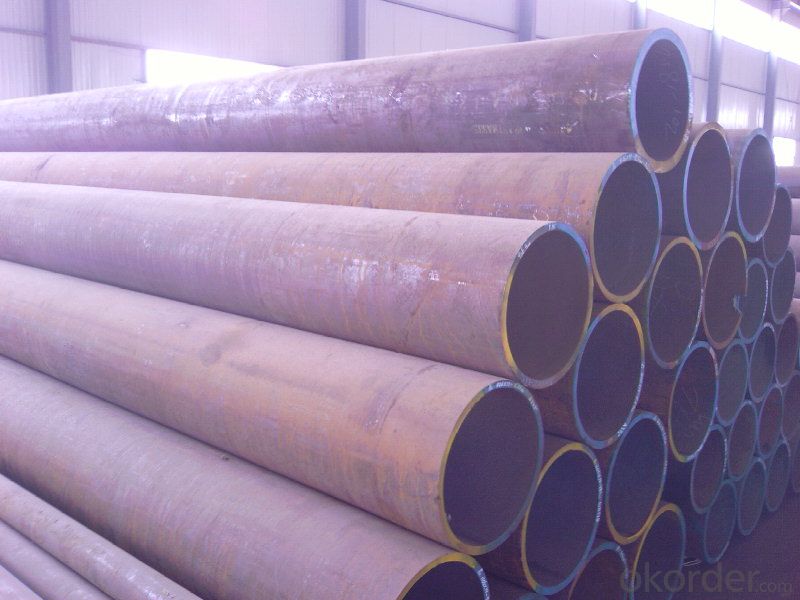
FAQ:
Q1: Why buy Materials & Equipment from OKorder.com?
A1: All products offered byOKorder.com are carefully selected from China's most reliable manufacturing enterprises. Through its ISO certifications, OKorder.com adheres to the highest standards and a commitment to supply chain safety and customer satisfaction.
Q2: How do we guarantee the quality of our products?
A2: We have established an advanced quality management system which conducts strict quality tests at every step, from raw materials to the final product. At the same time, we provide extensive follow-up service assurances as required.
Q3: How soon can we receive the product after purchase?
A3: Within three days of placing an order, we will begin production. The specific shipping date is dependent upon international and government factors, but is typically 7 to 10 workdays.
Q4: What makes stainless steel stainless?
A4: Stainless steel must contain at least 10.5 % chromium. It is this element that reacts with the oxygen in the air to form a complex chrome-oxide surface layer that is invisible but strong enough to prevent further oxygen from "staining" (rusting) the surface. Higher levels of chromium and the addition of other alloying elements such as nickel and molybdenum enhance this surface layer and improve the corrosion resistance of the stainless material.
Q5: Can stainless steel rust?
A5: Stainless does not "rust" as you think of regular steel rusting with a red oxide on the surface that flakes off. If you see red rust it is probably due to some iron particles that have contaminated the surface of the stainless steel and it is these iron particles that are rusting. Look at the source of the rusting and see if you can remove it from the surface.
Q6: What is the difference between galvanized steel and galvalume steel?
A6: Galvanized steel is metallic coated with Zinc in various coating weights. Minimum recommended for painted metal roofs is G90. Galvalume is a zinc and aluminum coated steel that becomes an alloy and is recommended in either painted or bare applications with a minimum coating weight of AZ50. Galvalume has an excellent performance life in bare exposures. Hence if you are using a bare panel use galvalume and if painted use either.
Q7: Is there a difference in thermal conductivity between stainless steel and steel?
A6: Yes. Stainless Steel has a lower thermal conductivity rate than steel; approximately 1/3 to 1/5th depending on the material.
Q8: Is there a difference in electrical conductivity between stainless steel and steel?
A8: Yes. Steel is generally more conductive than stainless steel. Steel has resistivity in the range of 10~20Ωm, while stainless has a resistivity of approximately 60~72Ωm.
- Q: How are steel pipes used in the automotive manufacturing industry?
- Steel pipes are commonly used in the automotive manufacturing industry for various applications such as exhaust systems, fuel lines, and structural components. They provide durability, strength, and resistance to heat and corrosion, making them ideal for withstanding the harsh conditions of vehicles.
- Q: Are steel pipes suitable for industrial cooling systems?
- Indeed, steel pipes prove to be generally well suited for industrial cooling systems. Being a robust and long-lasting material, steel can endure the elevated pressures and temperature fluctuations commonly encountered in such systems. Furthermore, its exceptional resistance to corrosion renders it an ideal choice for utilization with water or other coolants. Moreover, steel pipes exhibit commendable thermal conductivity, facilitating efficient heat transfer during the cooling procedure. Additionally, these pipes are conveniently accessible and cost-effective, rendering them highly favored within industrial settings.
- Q: What are the different methods of pipe coating for steel pipes?
- There are several methods of pipe coating for steel pipes, including fusion-bonded epoxy (FBE) coating, three-layer polyethylene (3LPE) coating, three-layer polypropylene (3LPP) coating, and liquid epoxy coating. Each method offers different levels of protection against corrosion, abrasion, and other environmental factors, ensuring the durability and longevity of the steel pipes.
- Q: What is the flexibility of steel pipes?
- Steel pipes are known for their exceptional flexibility, making them highly versatile and suitable for a wide range of applications. The flexibility of steel pipes refers to their ability to bend and withstand various forms of stress without breaking or deforming. This flexibility is primarily due to the inherent properties of steel, such as its high tensile strength and ductility. Steel pipes can be bent and formed into different shapes without compromising their structural integrity. This allows for easier installation and routing around obstacles, making them more adaptable for complex plumbing or piping systems. Additionally, the flexibility of steel pipes enables them to withstand external forces, such as ground movements or temperature fluctuations, without experiencing significant damage. The flexibility of steel pipes also makes them suitable for applications that require dynamic movement or expansion. For instance, in oil and gas pipelines or in heating and cooling systems, where temperature variations can cause expansion and contraction, steel pipes are able to accommodate these changes without causing leaks or failures. Furthermore, the flexibility of steel pipes contributes to their durability and longevity. The ability to withstand bending and stress helps prevent the formation of cracks or fractures that can lead to leaks or structural failures. This characteristic makes steel pipes a reliable choice for demanding environments, including high-pressure systems or corrosive conditions. In summary, the flexibility of steel pipes is a crucial attribute that allows for easy installation, adaptability to various conditions, and long-term reliability. With their exceptional flexibility, steel pipes are widely preferred in numerous industries and applications where strength, durability, and versatility are essential.
- Q: Can steel pipes be used for solar power systems?
- Indeed, solar power systems can utilize steel pipes. In the realm of solar power systems, steel pipes find widespread usage in diverse applications such as constructing support structures, mounting systems, and piping systems for circulating heat transfer fluids. The reason behind the preference for steel pipes lies in their robustness, longevity, and ability to withstand various environmental conditions. These pipes possess the capability to bear the weight of solar panels and support structures, as well as endure the impact of wind and other external elements. Moreover, steel pipes can be easily tailored and welded to cater to specific project requirements. All in all, when it comes to solar power systems, steel pipes emerge as a dependable and cost-efficient alternative.
- Q: How are steel pipes used in the pulp and paper industry?
- Steel pipes are commonly used in the pulp and paper industry for various applications such as transporting water, steam, chemicals, and other fluids throughout the production process. They are used in the construction of pipelines, conveying raw materials, and transferring finished products. Steel pipes provide durability, reliability, and resistance to corrosion, making them suitable for handling the harsh conditions and corrosive substances found in the industry.
- Q: Can steel pipes be bent?
- Yes, steel pipes can be bent. The process of bending steel pipes typically involves using specialized tools and techniques such as pipe bending machines or hydraulic presses. These tools apply force to the pipe, causing it to deform and take on the desired shape or angle. The ability to bend steel pipes makes them versatile and suitable for various applications, including plumbing, construction, and manufacturing. However, it's important to note that the degree to which a steel pipe can be bent depends on factors such as the pipe's diameter, wall thickness, and the type of steel used.
- Q: How are steel pipes used in geothermal energy systems?
- Steel pipes are commonly used in geothermal energy systems to facilitate the transport of fluids, such as water or steam, between the geothermal source and the power plant. These pipes are designed to withstand high temperatures and pressures, ensuring the safe and efficient transfer of geothermal fluids. Additionally, steel pipes are used in the construction of geothermal wells, providing structural support and maintaining the integrity of the wellbore.
- Q: How can seamless steel tubes be produced?
- Tube mill, round tube billet, heating, perforation, three roll cross rolling, rolling or extrusion, removal of pipe, sizing (or reducing diameter), cooling, straightening, water pressure test (or flaw detection), marking, storage, cold rolling and hot rolling. Generally cold rolling, because of high accuracy.
- Q: What are the different types of supports used for steel pipes?
- The different types of supports used for steel pipes include pipe clamps, pipe hangers, pipe saddles, and pipe rollers. These supports are designed to securely hold and suspend the steel pipes in place, ensuring proper alignment and preventing sagging or movement.
Send your message to us
CARBON STEEL SEAMLESS PIPES FROM CNBM WITH GOOD PRICE
- Loading Port:
- Tianjin
- Payment Terms:
- TT OR LC
- Min Order Qty:
- 50 m.t.
- Supply Capability:
- 500 m.t./month
OKorder Service Pledge
OKorder Financial Service
Similar products
Hot products
Hot Searches
Related keywords
